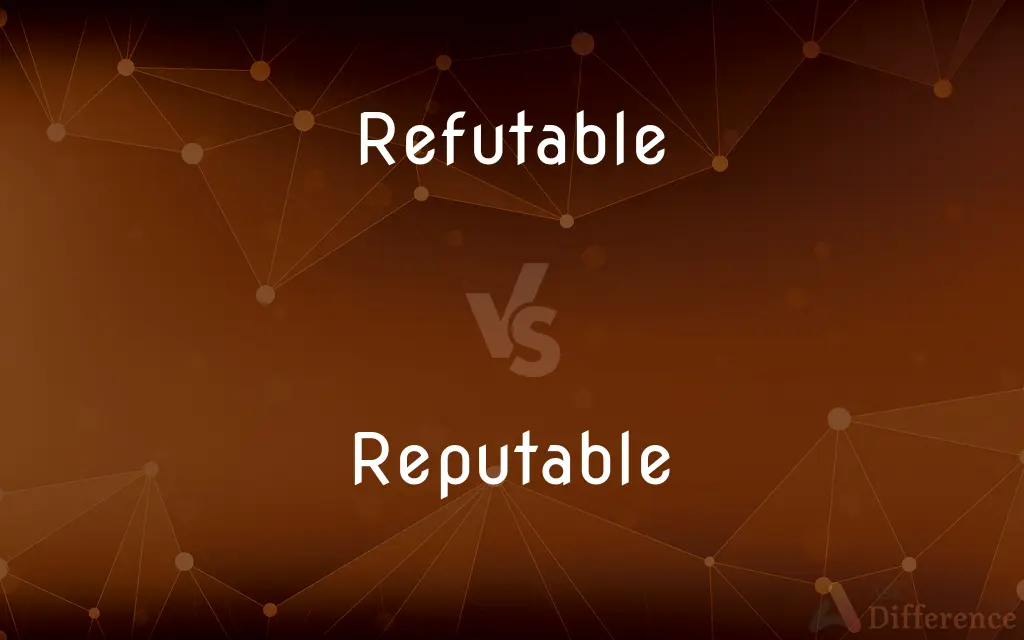Refutable vs. Reputable — What's the Difference?
By Tayyaba Rehman — Updated on October 27, 2023
Refutable pertains to the ability to prove something as false, while Reputable relates to being respected or trustworthy. They have distinct meanings, with one addressing verifiability and the other reputation.

Difference Between Refutable and Reputable
Table of Contents
ADVERTISEMENT
Key Differences
Refutable and Reputable are two words that, despite sounding somewhat similar, convey different ideas. Refutable concerns the potential to disprove or debunk an assertion, whereas Reputable is about having a good reputation or being trustworthy.
A claim or theory that is Refutable is one that can be proven wrong through evidence or argument. In contrast, a person or organization described as Reputable is recognized for their credibility, integrity, or high standards.
Scientific theories, for instance, should be Refutable. This means they can be tested and potentially disproven. A Reputable scientist, on the other hand, is one who has earned respect and trust in the scientific community through consistent and ethical work.
Being Refutable doesn't necessarily mean something is false; it just means there's a possibility to disprove it. In contrast, being Reputable doesn't guarantee perfection but suggests a general reliability or trustworthiness.
Legal arguments in court might be Refutable, indicating they can be contested and possibly disproven. A Reputable law firm, conversely, would be one with a track record of integrity, professionalism, and success.
ADVERTISEMENT
Comparison Chart
Definition
Capable of being proven false.
Having a good reputation.
Context of Use
Concerns the potential to disprove an assertion.
Relates to credibility, trustworthiness, or esteem.
Implication
Indicates possibility of debunking.
Suggests reliability or respectability.
Application
Often used in scientific or logical contexts.
Used to describe trustworthy individuals/organizations.
Examples
Seen in theories, claims, or arguments.
Found describing respected firms, individuals, etc.
Compare with Definitions
Refutable
Capable of being proven false.
The hypothesis was Refutable by the latest research findings.
Reputable
Of good standing and character.
The award was given by a Reputable institution.
Refutable
Open to challenge or rebuttal.
His statement was Refutable, lacking solid evidence.
Reputable
Having a good reputation.
She worked for a Reputable law firm in the city.
Refutable
Subject to disproof or contradiction.
The theory remained Refutable despite its wide acceptance.
Reputable
Regarded as reliable or trustworthy.
It's wise to buy products from Reputable sources.
Refutable
Not conclusively established.
Her assumptions were Refutable and required further validation.
Reputable
Esteemed or respected by others.
He was a Reputable scholar in his field.
Refutable
To prove to be false or erroneous; overthrow by argument or proof
Refute testimony.
Reputable
Having established integrity or credibility.
She was known to be a Reputable journalist who fact-checked her stories.
Refutable
To deny the accuracy or truth of
Refuted the results of the poll.
Reputable
Having a good reputation; honorable.
Refutable
Usage Problem To repudiate.
Reputable
Having a good reputation; honourable.
He was a reputable businessman.
Refutable
Able to be refuted, or shown to be false.
Reputable
Having, or worthy of, good repute; held in esteem; honorable; praiseworthy; as, a reputable man or character; reputable conduct.
In the article of danger, it is as reputable to elude an enemy as defeat one.
Refutable
Admitting of being refuted or disproved; capable of being proved false or erroneous.
Reputable
Having a good reputation;
A reputable business
A reputable scientist
A reputable wine
Refutable
Able to be refuted
Refutable
Potentially incorrect or mistaken.
The detective's initial hunch was Refutable.
Common Curiosities
How does one earn a Reputable status?
By consistently demonstrating integrity, reliability, and high standards over time.
Does Refutable always mean something is incorrect?
No, Refutable means it's open to disproof, not necessarily that it's incorrect.
How can someone determine if a business is Reputable?
By checking reviews, ratings, and seeking referrals or testimonials.
How do Refutable and Reputable differ in meaning?
Refutable means capable of being proven false, while Reputable means having a good reputation or trustworthiness.
Can a Reputable source present a Refutable claim?
Yes, even Reputable sources can present claims that are Refutable or open to challenge.
Are all Reputable organizations flawless?
No, being Reputable suggests a good standing or trustworthiness, but not perfection.
Can a theory be both Refutable and accepted?
Yes, many widely accepted theories in science are Refutable, as they can be tested and potentially disproven.
Are all Refutable arguments weak?
Not necessarily. Being Refutable just means an argument is open to challenge, not that it lacks merit.
Can facts be Refutable?
Genuine facts are established truths, but what is presented as a "fact" can be Refutable if it's open to disproof.
Why is Refutability important in logic?
Refutability allows for claims to be challenged and tested, ensuring robust logical arguments.
Is it beneficial for scientific theories to be Refutable?
Yes, Refutability allows theories to be tested, challenged, and refined, which is essential for scientific progress.
Can someone be both Reputable and controversial?
Yes, an individual can be respected in some circles (Reputable) while still holding controversial views.
Does Reputable always mean popular?
No, being Reputable suggests trustworthiness, not necessarily popularity.
Are Refutable claims always false?
No, a Refutable claim can be true; it merely means it's open to potential disproof.
Is a Reputable brand always the best choice?
While Reputable brands often offer reliability, it's still crucial to assess specific needs and preferences.
Share Your Discovery

Previous Comparison
Hub vs. Hud
Next Comparison
Yummies vs. YummyAuthor Spotlight
Written by
Tayyaba RehmanTayyaba Rehman is a distinguished writer, currently serving as a primary contributor to askdifference.com. As a researcher in semantics and etymology, Tayyaba's passion for the complexity of languages and their distinctions has found a perfect home on the platform. Tayyaba delves into the intricacies of language, distinguishing between commonly confused words and phrases, thereby providing clarity for readers worldwide.














































